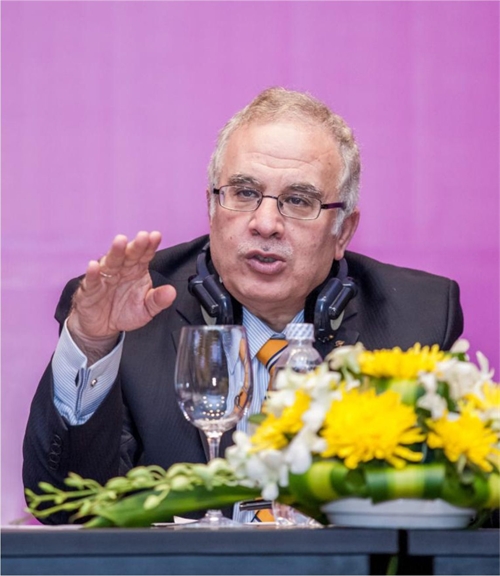 Society
Society

Dr. Osama Hamdy, a leading expert in diabetes and obesity, has recommended that people with diabetes should have a nutrition plan that can be customized to fit their culture and lifestyle, as that could significantly improve their health.
 |
| Dr. Osama Hamdy, MD, PhD, FACE Medical Director of the Obesity Clinical Program at Joslin Clinic |
Dr. Osama Hamdy, a leading expert in diabetes and obesity, has recommended that people with diabetes should have a nutrition plan that can be customized to fit their culture and lifestyle, as that could significantly improve their health.
He made the recommendation at the symposium "Update on the latest clinical studies and practices in nutritional strategy for diabetes management”, hosted by Abbott in cooperation with the Viet Nam Association of Diabetes and Endocrinology on July 9.
Việt Nam News interviewed Dr. Osama Hamdy to explore this further.
Can you share what the key challenges for people with diabetes are?
It’s crucial for people with diabetes to strictly follow three factors: a balanced nutrition, medication and exercise regime. The common challenge is about adjusting the daily eating habit to control blood glucose levels while maintaining sufficient protein. Many people with type 2 diabetes find themselves struggling with their daily diet to have adequate nutrition and stable blood sugar levels. For them, a strict eating plan with low calories to keep a stable blood sugar level may make them often feel hungry, craving for food and lack of energy for daily activities.
Hence, besides medical treatment, diabetes nutrition therapy plays an important role in diabetes management and care. This can help to provide sufficient nutrients for people with type 2 diabetes while stabilising their blood sugar and minimising sugar spikes after consuming food.
How can the results of the latest international studies and practices you have shared in the symposium help healthcare professionals in Viet Nam in diabetes management?
In this symposium, I have shared with healthcare professionals in Viet Nam the latest clinical studies in diabetes management, including a new study named "Transcultural Diabetes-Specific Nutrition Algorithm (tDNA) which has shown promising results in improving weight loss and HBA1c in Overweight & Obese Type 2 Diabetes Mellitus patients in a primary care clinic in Malaysia”. This study was also presented at the recent American Diabetes Association’s 76th Scientific Sessions.
In the tDNA study in Malaysia, researchers evaluated 230 people with Type 2 diabetes who were divided into two groups. One received standard care while the other group followed the tDNA guidelines, which included 1-2 servings of a diabetes-specific nutrition formula (in this case we used Glucerna® made by Abbott) in conjunction with a daily low calorie meal plan. Both groups received dietary counselling, 150-minutes of exercise per week and a monthly check-up. After six months, the tDNA group had lower blood sugar levels and body weights, on average, than the standard care group.
Specifically, the tDNA group:
The diabetes population and physical conditions of people with diabetes in Malaysia are very similar to those in Viet Nam. I think Viet Nam can start to develop a diabetes-specific nutrition algorithm; it will bring solutions for both the healthcare professionals and people with diabetes to manage diabetes better.
As one of the lead investigators when the first global tDNA was created, can you share further about the tDNA?
An algorithm is a finite list of steps that can be taken to solve a specific problem or to get a certain result. A transcultural diabetes-specific nutrition algorithm (tDNA), which was published in the Current Diabetes Reports in 2012, was developed by health care professionals and for health care professionals to offer people with diabetes a structured plan that considers their medical history, behaviours, risk factors, as well as things like ethno-cultural backgrounds, genetics and the environment they live, to improve outcomes and optimize treatment for people at risk and those with diabetes.
Healthcare professionals will be able to use the algorithm as an in-office screening tool to help assess patients for risk of diabetes based upon medical history, behaviour and ethno-cultural background. For those already diagnosed, it will allow healthcare professionals to design a customised treatment plan for their patients incorporating diabetes-specific nutrition therapy that accounts for global differences in genetics, lifestyle, foods and cultures.
Ninety-one per cent of people with diabetes in Viet Nam claim that changing their eating habits is a real challenge. Do you have any advice for them to have a complete and balanced nutrition for their daily lives?
Scientific evidence shows that nutrition therapy improves glycemic control and reduces the risk of diabetes and its complications. Accordingly, diabetes-specific nutrition should be incorporated into patient management programmes.
In the clinical study from Malaysia, the group which received the tDNA structured nutrition plan also were given special diabetic nutrition formula. This special formula will support in controlling blood glucose levels, with the glycemic index at 41, within the recommendation of American Diabetes Association. - VNS




